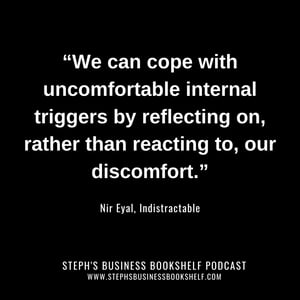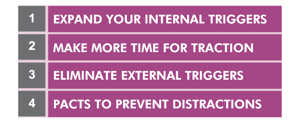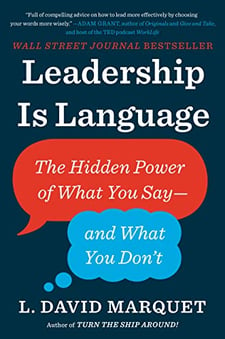 Whether it’s the circumstances surrounding COVID-19 or not, I’ve found myself being more distracted than ever.
Whether it’s the circumstances surrounding COVID-19 or not, I’ve found myself being more distracted than ever.
How about you?
To become more focused, I just finished Nir Eyal Indistractable.
Here are three elements I’ve found most helpful:
- All motivation is a desire to escape discomfort. If a behavior was previously effective at providing relief, we’re likely to continue using it as a tool to escape discomfort.
- Distraction is very often something you can control, if you surf the wave, and can defer your attention from it for just 10 minutes (as this 7:30 video explains)
- Time management is pain management. Distractions cost us time, and like all actions, they are spurred by the desire to escape discomfort.
The 10-Minute Rule
By reimagining an uncomfortable internal trigger, we can disarm it. (see 1:45 in video)
- Step 1. Look for the emotion preceding distraction.

- Step 2. Write down the internal trigger.
- Step 3. Explore the negative sensation with curiosity instead of contempt.
- Step 4. Be extra cautious during liminal moments.
Willpower – Can be Restored by your Attitude
We’ve shared several blogs on Will Power based on Roy Baumeister’s study (see 3:32 of video above). Included are: Willpower Rules Your Performance, LIE #4 – Willpower is Always on Will-Call, Work Longer – Make Poor Decisions, The Truth About Discipline, Habit, and Willpower, These blogs incorrectly indicate willpower is a limited resource, as offered in Gary Keller’s The ONE Thing: The Surprisingly Simple Truth Behind Extraordinary Results.
 The TRUTH IS Willpower is ONLY limited IF YOU believe it is. (See 4:10 in video Carol Dweck’s research)
The TRUTH IS Willpower is ONLY limited IF YOU believe it is. (See 4:10 in video Carol Dweck’s research)
When you see every setback as an opportunity, practice gratitude, you become happier. Every time you can resist an urge you get stronger and discover the willpower to get past the urge, thus prevent distraction.
The video also explains what to do when you fail to remember this.
Create an effort pact. There are three kinds of pacts.
- Effort pacts – Add effort between yourself and the thing you want to stop doing (See the example of a kSafe at 5:15 of the video)
- Price Pacts – Pacts which cost you money when you break them. (See 5:40 on video)
- Identity pacts – Tell the world who you are, and what you don’t do. (See 6:05 on video)
The antidote to Impulsiveness is Forethought
Nir Eyal’s prescription for handling distraction is to realize you can surf through distractions by deciding to allow yourself 10-minutes before giving in to any distraction. Doing so will allow time for the distraction to subside, and for you to continue working on your intended traction area.
Watch the Summary is at (6:32)
The Keys to Controlling Your Attention
Step #1 — Expand your internal triggers. Triggers can lead to either traction (moving towards your goals) or distraction (movement away from your goals). You need to make sure that your internal triggers are providing you with cues to act to move forward, not backwards.
Step #2 — Make more time for traction. Traction is good, it's what you want more of. Traction draws you towards what you want more of in life. The best way to generate more traction is still to time box your day in terms of time you spend on work, relationships, and you. Have a calendar which reflects your values, and make sure you build in a set weekly time where you reflect and refine what you're doing.
Step #3 — Eliminate external triggers. To become indistractable, you must eliminate all the external triggers which try and gain unauthorized access to your time and resources. The key to doing this is disarmingly simple. Every time you receive any kind of external trigger, pause, and ask yourself: "Is this trigger serving me, or am I serving it?" Use the helpful external triggers and give yourself full permission to ignore completely any unhelpful triggers.
Step #4 — Pacts to prevent distractions. Focus not only requires that you keep distractions out, but also that you have systems to stop yourself from sliding into distractions unawares. The best way to do that is to make a precommitment, a pact, that removes future opportunities for distraction. This will only work if you have first dealt effectively with internal triggers, removed external triggers, and set aside time for traction.
If you’re struggling with distraction, I highly recommend Indistractable: How to Control Your Attention and Choose Your Life.
Growth demands Strategic Discipline.
To build an enduring great organization, requires disciplined people, disciplined thought, disciplined action, to produce superior results, and make a distinctive impact in the world.
-2.jpg?width=300&name=3%20Disciplines%20of%20Execution%20(Strategic%20Discipline)-2.jpg) Discipline sustains momentum, over a long period of time, laying the foundations for lasting endurance.
Discipline sustains momentum, over a long period of time, laying the foundations for lasting endurance.
A winning habit starts with 3 Strategic Disciplines: Priority, Metrics and Meeting Rhythms. Forecasting, accountability, individual, and team performance improve dramatically.
Meeting Rhythms achieve a disciplined focus on performance metrics to drive growth.
Let Positioning Systems help your business achieve these outcomes on the Four most Important Decisions your business faces:
|
DECISION |
RESULT/OUTCOME |
|
PEOPLE |
|
|
STRATEGY |
|
|
EXECUTION |
|
|
CASH |
|
Positioning Systems helps mid-sized ($5M - $250M) business Scale-UP. We align your business to focus on Your One Thing! Contact dwick@positioningsystems.com to Scale Up your business! Take our Four Decisions Needs Assessment to discover how your business measures against other Scaled Up companies. We’ll contact you.
NEXT BLOG – Leadership is Language






.jpeg?width=150&height=135&name=Hand%20with%20marker%20writing%20the%20question%20Whats%20Next_%20(1).jpeg)

